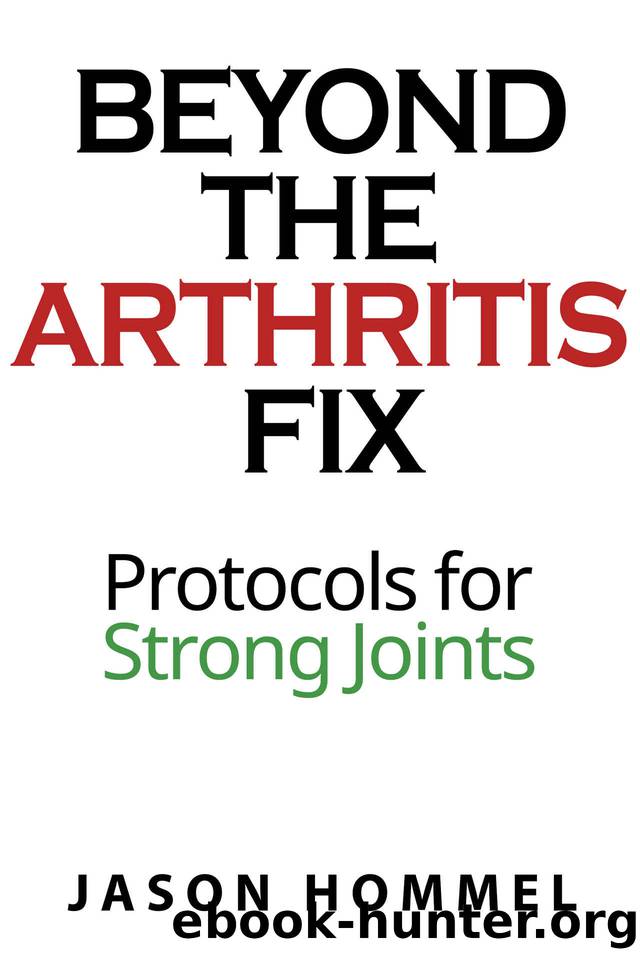Beyond the Arthritis Fix: Protocols for Strong Joints by Jason Hommel

Author:Jason Hommel [Hommel, Jason]
Language: eng
Format: mobi, epub
Published: 2020-12-15T00:00:00+00:00
One group of people who get a diagnosis of "high copper", from which the very concept of "toxic copper" comes from, are Wilson's disease patients. They often die of liver failure. But copper is supposed to cure liver disease. This indicates, to me, that it's their overall toxic burden from other things that is the problem, not that copper is toxic. They also have low copper serum, and low ceruloplasmin, a copper transport protein. So, they have three signs of low copper, and low copper is associated with liver disease. So they might not be copper toxic at all, as they have signs of being unable to use the copper that they do have. They say this is a genetic disease, but 2/3rds of the genes can change just with bodybuilding. Lifting weights also increases a person's ceruloplasmin!
So, here is a list (not necessarily complete) of 31 things that tend to block, or reduce, or use up copper, and thus, increase the demand and increase the need for copper supplements: The good things on this list would also make high copper doses safer since they are all reducing copper in the body.
Greens, iodine, selenium, vitamin C, zinc, DMSO/MSM sulfur, silica, boron, iron, calcium, potassium, silver, molybdenum, cadmium, exercise, sweating heavily, drinking distilled water, watermelon (glutathione), sunlight, coffee, stress, niacin, sugar, alcohol, pain killers, mints, fluoride, lead, other toxins, drugs, prescription drugs ...
Here is another list: "Major mineral antagonists to copper utilization have been listed as being sulfur, silver, iron, molybdenum, potassium, cadmium, zinc, lead and selenium (Owen, 1982)." https://link.springer.com/chapter/10.1007/978-1-4613-0537-8_4
That list of 9 items helped me add 5 items to my own list: silver, molybdenum, potassium, cadmium, and lead.
Some of those are complementary to copper, at lower levels, and only become antagonistic at higher levels, the ones I know about that act this way, as reported in the literature are: Molybdenum, Iron, Zinc, Calcium, Vitamin C, and Niacin. And calcium and potassium, at smaller doses, help the body retain copper. I suspect this synergistic and complementary effect at some lower level is universal among everything good for the body in general, such as greens, iodine, selenium, sulfur, silica, boron, etc.
These things not only block and use up copper, but these things help make copper safer, and less toxic. Except for the toxins: drugs, and fluoride. Fluoride disrupts ceruloplasmin production and therefore disrupts copper metabolism.
"The total protein-bound sialic acid and ceruloplasmin levels in serum were reduced, whereas the fluoride levels were increased showing a cumulative effect."
https://www.sciencedirect.com/science/article/abs/pii/0378427483901601
From my personal experience, the strongest interaction effect with copper might be either iodine or niacin. Niacin makes me very tired (low copper). Niacin reportedly makes other people tired. There is one man who markets a copper-niacin supplement as the perfect copper supplement, but of course, it's expensive. Why not just take copper and niacin together?
I already went over how niacin likely blocks copper in my chapter on Niacin. Here are a few further thoughts:
I read about a man in a high niacin forum complain about liver problems, which is another sign of copper deficiency.
Download
Beyond the Arthritis Fix: Protocols for Strong Joints by Jason Hommel.epub
This site does not store any files on its server. We only index and link to content provided by other sites. Please contact the content providers to delete copyright contents if any and email us, we'll remove relevant links or contents immediately.
Men In Love by Nancy Friday(5240)
Everything Happens for a Reason by Kate Bowler(4743)
The Immortal Life of Henrietta Lacks by Rebecca Skloot(4589)
Why We Sleep by Matthew Walker(4447)
The Sports Rules Book by Human Kinetics(4388)
Not a Diet Book by James Smith(3429)
The Emperor of All Maladies: A Biography of Cancer by Siddhartha Mukherjee(3163)
Sapiens and Homo Deus by Yuval Noah Harari(3072)
Day by Elie Wiesel(2786)
Angels in America by Tony Kushner(2662)
A Burst of Light by Audre Lorde(2608)
Endless Forms Most Beautiful by Sean B. Carroll(2483)
Hashimoto's Protocol by Izabella Wentz PharmD(2377)
Dirty Genes by Ben Lynch(2318)
Reservoir 13 by Jon McGregor(2304)
Wonder by R J Palacio(2211)
And the Band Played On by Randy Shilts(2210)
The Immune System Recovery Plan by Susan Blum(2059)
Stretching to Stay Young by Jessica Matthews(2045)
